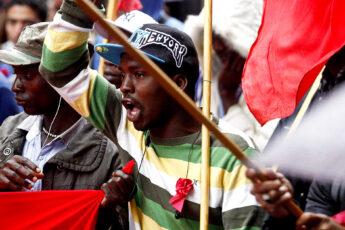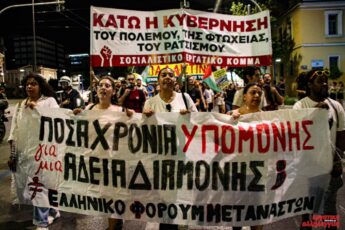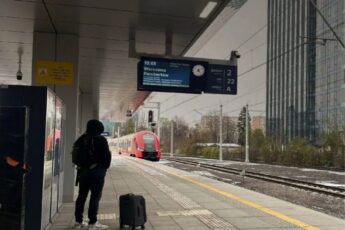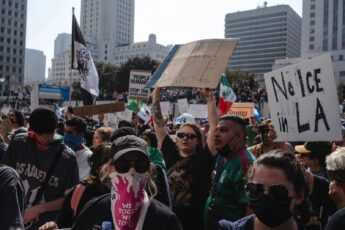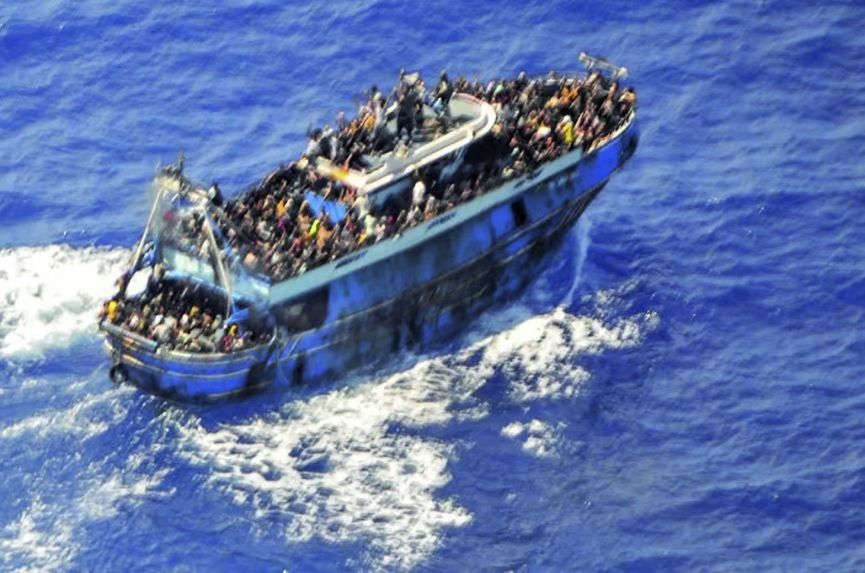
TRANSNATIONAL MIGRANTS COORDINATION
Today, in Kalamata (Greece), the trial of the 9 migrants who survived the shipwreck off the coast of Pylos on May 14, 2023, in which 600 migrants died, is taking place. The 9 migrants are accused of human trafficking and face life sentences. According to the testimonies of the survivors, the shipwreck was in fact caused by the Greek Coast Guard in an attempt to carry out another pushback by towing the fishing vessel to Italy, so that the responsibility for rescuing the migrants would be shifted to Italy. The Greek state is covering up all evidence of this mass crime. At the same time, the Greek authorities continue using a disgraceful strategy—accusing the few migrants who do not die at sea of smuggling—to curb arrivals on its national soil. For the same reasons, another 2,000 migrants are locked up in Greek prisons today.
We stand with the accused migrants, victims of a racist European system that is responsible for the systematic deaths of thousands of migrants crossing the Mediterranean, for the repatriation of migrants to countries where they suffer persecution, torture, violence, war, and exploitation, and for agreements with third countries that trade migrants’ lives for the economic and political interests of EU member states.
The racist tactics of the Greek government are not isolated. In the new transnational scenario, marked both by the war in Ukraine and the genocide in Gaza, a war against migrants has long been underway. Racism in European countries is not new and cannot be reduced to the ongoing wars, but they certainly contribute to exacerbating it. Wars, bombings, and the destruction of entire cities inevitably produce refugees, but they also fuel nationalism, the defense of the homeland, and thus the closure of borders. Indeed, with the war in Ukraine, the EU hurried to distinguish between refugees on the basis of skin color, making migrants from Africa or Asia second-class refugees and closing the borders to them. Since the beginning of the bombing of Gaza, Egypt has been preparing centers to gather and detain Palestinian refugees, and the growing Islamophobia in Europe is threatening the lives of migrants of Arab descent and repressing dissent.
While European countries participate in these wars through weapon supplies and military aid to Ukraine and ideological and financial support for the genocide in Gaza, the military turn is reshaping Europe at all levels. One of the crucial aspects of this process is the militarization of borders and the strengthening of technologies that, when not used to identify targets to bomb, destroy, or kill, are used to register, screen, and monitor migrants at Europe’s borders. Europe is thereby investing in the construction of a military-industrial-academic complex that intensifies the ongoing war against the freedom of migrants.
The violent and deadly defense of borders that we can witness in Greece, as in Italy, along the Balkan Route, and in the UK, is used as a powerful practical and rhetorical tool for defending national citizens and the homeland at a historical moment characterized both by a deep economic crisis and an increasing fear of an ever closer war. This “defense” is in fact an attack on all of us, since it is used to impoverish everyone and increase exploitation and precarity, especially for women, whose lives are increasingly constrained by patriarchal policies.
For this reason, the EU countries agreed to sign the European Pact on Migration and Asylum in March, which restricts the right to asylum, shifts not only the procedures for identifying and selecting migrants to the borders but also their detention in centers, from where they can then be more quickly and arbitrarily repatriated or sent to third countries. The Pact is undoubtedly a political response to migrants who use asylum on a massive scale to challenge restrictions on movement, to stay in Europe, and to obtain the documents they need to build new lives. Indeed, after the pandemic, arrivals resumed at an unbroken pace. Border centers such as Lampedusa are constantly overcrowded, and new routes have opened from North Africa to Greece, Spain, and Italy. However, the European states’ policy of planned deaths at sea is no longer enough.
The European pact reinforces the existing institutional racism. It makes it even more systematic, making collaboration with third countries a fundamental pillar to protect Europe from one of the enemies it is at war with, namely migrants. Thus, Italy is making agreements with Libya, Tunisia, Egypt, Turkey, Lebanon, and Albania to keep migrants out of its territory; Greece has made them with Turkey and the UK with France and Rwanda. While these agreements nourish the idea of a European fortress that prevents migrants from stealing jobs, social services, and welfare from pure, local citizens, they also allow quotas of migrants to enter and be employed in the most underpaid and exploited sectors.
The EU’s investment in the military industry and defense has also had a huge impact on the lives of the migrants who are able to stay in Europe. It is no coincidence that in Greece, as in Italy, there are many struggles against the deterioration of the unlivable conditions in the reception centers; in France, migrants are protesting against the cuts in housing and foyers where they can live once they have obtained documents. For this reason, we stand with the 9 migrants who will be tried today, with the migrants living in overcrowded reception centers where there is neither hygiene nor healthy food, with the migrants locked up in detention centers and waiting for years for a residence permit, with the migrants exploited in logistics, in the fields, or the care sectors, also mean standing against the war.
Together with our comrades in Greece, we claim no penalty and the immediate release of the 9 migrant survivors. Freedom to all migrants and solidarity activists who are in Greek prisons on trafficking charges. Stop the deportations and killings at the borders. Stop the war in Ukraine and the genocide in Gaza!


